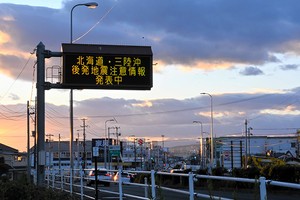Vox Populi, Vox Dei is a daily column that runs on Page 1 of The Asahi Shimbun.
June 3, 2023 at 14:57 JST
 A tuition-free private academy in Fukuoka Prefecture (Asahi Shimbun file photo)
A tuition-free private academy in Fukuoka Prefecture (Asahi Shimbun file photo)
“What did you do at school today?” is a commonplace question for children. But Haruhi Yoshizawa, 21, a fourth-year student at Chuo University in Tokyo, would never ask this question because not all youngsters go to school and some are uncomfortable about their own truancy. He would, therefore, ask simply, “How was your day?” He reckons that works just fine.
Yoshizawa runs a tuition-free private “juku” academy named Kawasaki Mebuki Juku (literally, Kawasaki juku for sprouting buds) for 40 adolescents of junior and senior high school age who are truant or from financially strapped homes.
All teachers at the academy are volunteers, and donations and other endowments support the institution financially.
Yoshizawa was inspired to establish the school two years ago after he read in a newspaper that one in seven Japanese children struggled with poverty. He realized how fortunate he was.
He invited me to observe a class one Saturday evening. Young people started filling a room in a public facility in the city of Kawasaki in Kanagawa Prefecture. The teacher-student ratio was about 1 to 1. Everyone seemed to be happy, talking like they were friends.
Nowadays, tuition-free juku academies exist all over the nation as valuable places of education for youngsters who are academically unable to keep up with the classes at regular schools but cannot afford to attend expensive after-hours “cram schools."
Those academies bring to the students their much-needed sense of belonging.
But this raises the simple question: What, then, are “regular” schools for?
“Because all the students at my academy are really eager to learn, their performance levels are rising phenomenally,” noted Yoshizawa.
As I prepared to take my leave, I asked him what he considered most important now. With a shy smile, he replied, “Human feelings and kindness.”
--The Asahi Shimbun, June 3
* * *
Vox Populi, Vox Dei is a popular daily column that takes up a wide range of topics, including culture, arts and social trends and developments. Written by veteran Asahi Shimbun writers, the column provides useful perspectives on and insights into contemporary Japan and its culture.




















A peek through the music industry’s curtain at the producers who harnessed social media to help their idols go global.
A series based on diplomatic documents declassified by Japan’s Foreign Ministry
Here is a collection of first-hand accounts by “hibakusha” atomic bomb survivors.
Cooking experts, chefs and others involved in the field of food introduce their special recipes intertwined with their paths in life.
A series about Japanese-Americans and their memories of World War II